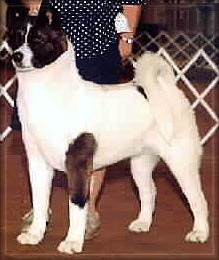Akita Large, powerful, alert, with much substance and heavy bone. The broad head, forming a blunt triangle, with deep muzzle, small eyes and erect ears carried forward in line with back of neck, is characteristic of the breed. The large, curled tail, balancing the broad head, is also characteristic of the breed. Head Massive but in balance with body; free of wrinkle when at ease. Skull flat between ears and broad; jaws square and powerful with minimal dewlap. Head forms a blunt triangle when viewed from above. Fault-Narrow or snipy head. Muzzle-Broad and full. Distance from nose to stop is to distance from stop to occiput as 2 is to 3. Stop-Well defined, but not too abrupt. A shallow furrow extends well up forehead. Nose-Broad and black. Liver permitted on white Akitas, but black always preferred. Disqualification-Butterfly nose or total lack of pigmentation on nose. Ears-The ears of the Akita are characteristic of the breed. They are strongly erect and small in relation to rest of head. If ear is folded forward for measuring length, tip will touch upper eye rim. Ears are triangular, slightly rounded at tip, wide at base, set wide on head but not too low, and carried slightly forward over eyes in line with back of neck. Disqualification-Drop or broken ears. Eyes-Dark brown, small, deep-set and triangular in shape. Eye rims black and tight. Lips- and Tongue-Lips black and not pendulous; tongue pink. Teeth-Strong with scissors bite preferred, but level bite acceptable. Disqualification-Noticeably undershot or overshot. |


